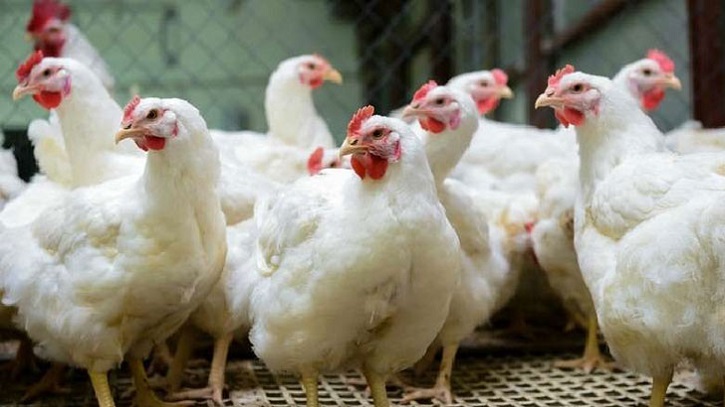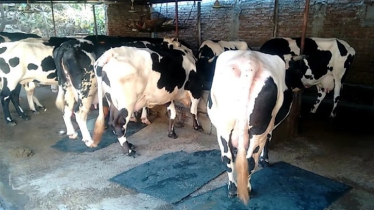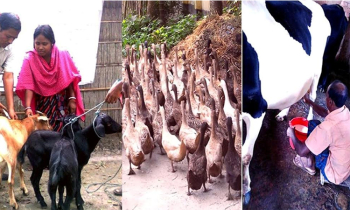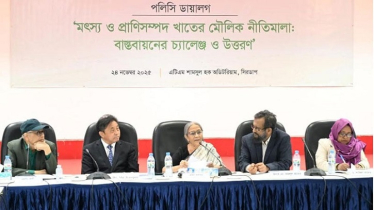
Most small-scale broiler farms across Bangladesh are routinely administering unnecessary “preventive” antibiotics to healthy chickens, driven by the advice of untrained dealers who operate without veterinary knowledge. These dealers often encourage excessive antibiotic use to boost the sale of medicines, leaving farmers dependent on their recommendations due to a lack of formal training.
Experts warn that indiscriminate antibiotic use on broiler farms can make all existing bacteria in the farms resistant to the drugs. Many of these bacteria, including Salmonella and E. coli, can infect humans. As these bacteria become increasingly drug-resistant, treating infected patients will become significantly more difficult.
Farmers under contract farming arrangements, however, generally receive training and regular guidance from poultry companies. As a result, they avoid unnecessary antibiotic use and focus more on preventing infections rather than treating them. They implement stringent biosecurity practices such as hand and foot washing before entering poultry sheds and installing fencing around farms to block external contamination. Contract farmers are also instructed not to use preventive antibiotics on healthy chickens, as companies consider it an unnecessary expense and a form of wastage.
Imran Mondol, 28, from Sanarhat in Pirganj, Rangpur, who started poultry farming after completing his bachelor's degree, said he routinely applies whatever antibiotics the dealer provides. “From the time the chicks arrive until they are sold, I give antibiotics. The dealer supplies everything. For one thousand chickens, I spend around ten thousand taka on medicines and antibiotics,” he said.
Another farmer, Noor Alam, 38, from Machhari village in Kaunia, Rangpur, shared his earlier struggles. “From 2014 to 2019, I used various antibiotics from different companies but still failed to prevent outbreaks in my farm. Even after applying antibiotics, the chickens did not gain the expected weight. Now, under contract farming with 3,000 chickens, I no longer have to buy medicines. With company supervision, biosecurity measures, and regular veterinary guidance, we avoid antibiotic use,” he explained.
Dinajpur’s Mokshedul Haque, 44, who turned to poultry farming after losing his job during the pandemic, described his improved experience under company guidance. “Officials from Kazi Farms taught me how to raise healthy chickens at a lower cost. They supplied healthy day-old chicks and quality feed. I did not have to buy antibiotics, and by following their instructions, I earned Tk 71,000 from my last batch,” he said.
In contrast, Ahsan Habib, 46, a farmer from the same area, said he incurred continuous losses due to excessive antibiotic purchases. “For two years, I farmed one thousand chickens and used many medicines and antibiotics. But I could not earn profits equal to what I spent on them. I was urged to apply antibiotics three times in one batch, only to realize later that the dealer pushed unnecessary medicines for his own profit,” he said.
Veterinarian Md. Newaz Sharif, who works closely with poultry farmers in the Rangpur region, said antibiotics for animals, like those for humans, must not be used without a doctor’s prescription. “Unfortunately, many farmers do not know the proper methods of poultry management. Dealers instruct small farmers to use excessive antibiotics, promising enhanced disease prevention and faster weight gain,” he said.
He also stressed the need for observing appropriate withdrawal periods before selling chickens treated with antibiotics. “Otherwise, antibiotic residues may remain in the meat,” he warned.
Professor Dr. Zakir Hossain Habib, lead scientific officer and virologist at the Institute of Epidemiology, Disease Control and Research (IEDCR), said excessive and unnecessary antibiotic use in many poultry farms is putting public health at risk. “Overuse of antibiotics in poultry is contributing to decreased effectiveness of certain medicines used for human treatment,” he said. He emphasized the urgent need for systematic training for poultry farmers on proper antibiotic use to protect both animal and human health.
If you want, I can prepare a shorter version or a broadcast script as well.





